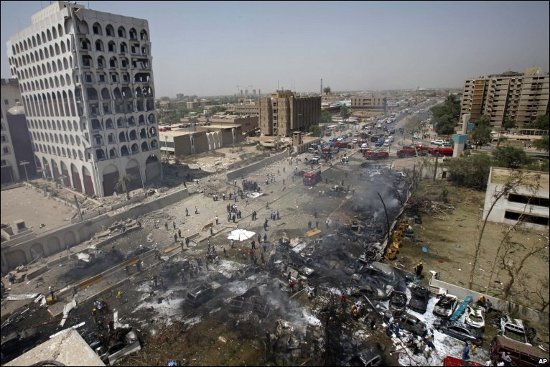|
|
|
The Iraqi Foreign Ministry in Baghdad after the August 19 suicide attacks. Photo by The New York Times. |
Joel Wing rolls up his sleeves again and does the boring yet essential work of analyzing mass casualty events within the context of Iraq’s overall decline in violence:
Every time there is a massive, headline-grabbing bombing in Iraq, it sets off a wave of reports and commentaries in the West about how the security situation in the country is getting worse. The most recent such attack was on December 8, 2009 when four targets in Baghdad were assaulted resulting in 127 deaths and 448 wounded. In August and October there were similar bombings of government ministries and the Baghdad provincial council building. A typical response was by John McCreary of AFCEA Intelligence who wrote on December 8 that, “Day by day, the security situation is deteriorating. This should surprise no Readers and it will get much worse in the next few months.” Thomas Ricks, author of the books The Fiasco and The Gamble, member of the Center for a New American Century think tank, who runs the Best Defense blog on the Foreign Policy website, is another who has an on-going series of posts called “Iraq, the unraveling” that argues things are going downhill in the country. The problem with these writers is that they appear to be basing their writings purely upon press reports, which focus almost exclusively on violence. As reported before, that gives a distorted picture of the situation. What they lack is any kind of research or background into the larger trend in violence that can put these attacks into context.
Wing goes on to detail the numbers. Money graf:
Third, attacks overall are down to their lowest levels since 2004.
And, surprisingly:
Some thought that the U.S. withdrawal from Iraq’s cities on June 30, 2009 would negatively affect security, but that hasn’t happened either. From mid-February to June 30, 2009 there were an average of 250 security incidents per week. From the withdrawal date to early November 2009 there has been an average of just under 200 attacks per week. The number killed has also seen a very slight decrease from before and after the pullout.
The entire post, complete with helpful charts, is highly recommended.
Terrorist attacks aimed at causing massive casualties in one or a few strikes are information operations designed to portray a drastically worsening security situation. The political goal of these operations is to undermine American assistance or, increasingly, undermine the perception that Iraqi security forces are competent. Additional goals can include a specific attempt to delegitimize Maliki’s security platform before the national elections in 2010, a generic attempt to delegitimize the Iraqi government as a whole or, in a word, chaos. It would be a mistake to assume that all terrorists in Iraq have cogent and achievable political aims. Some depraved components of al Qaeda’s strategy in the past few years have played like a South Park joke: “Step 1: Sow instability through extortion and mass murder. Step 2: ? Step 3: Profit!”
In significant ways, this narrative of insecurity remains true: no Iraqi feels completely comfortable or safe in a city where a large bomb could rip through a crowd at any given time. But in a larger, albeit colder sense, it’s imperative to recognize that it remains impossible to prevent all spectacular attacks without maintaining measures that also choke commerce and basic freedom of movement. And the overall trend in violence remains at historically low levels for the post-invasion period. To the extent commentators perpetuate an overall narrative of recently worsening security while ignoring this context, they are missing the lede.
Are you a dedicated reader of FDD's Long War Journal? Has our research benefitted you or your team over the years? Support our independent reporting and analysis today by considering a one-time or monthly donation. Thanks for reading! You can make a tax-deductible donation here.









3 Comments
Putting more Iraqi troops–provided that they are adequately trained–on the beat should drastically increase security, not the opposite. Only Iraqis, not Americans, can tell the difference between a Saudi accent or a Syrian accent, whereas American ears to whom Arabic is a barely acquired language cannot.
To paraphrase TE Lawrence, it is better to let the host country do something adequately than for us to do it perfectly.
It is because in Rick’s long narrative on Iraq, it HAS to unravel…he is beholden to it.
He and others who detested the use of American hard power against Saddam’s regime will stick to it, despite evidence to the contrary.
A major problem seems to be the reliance on useless sniffer guns at checkpoints. The Iraqi government has spent many millions on these fraudulent devices, having been told by some smart salesman that they would detect explosives in any passing vehicle.
See here for details.